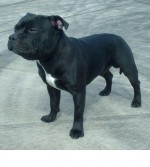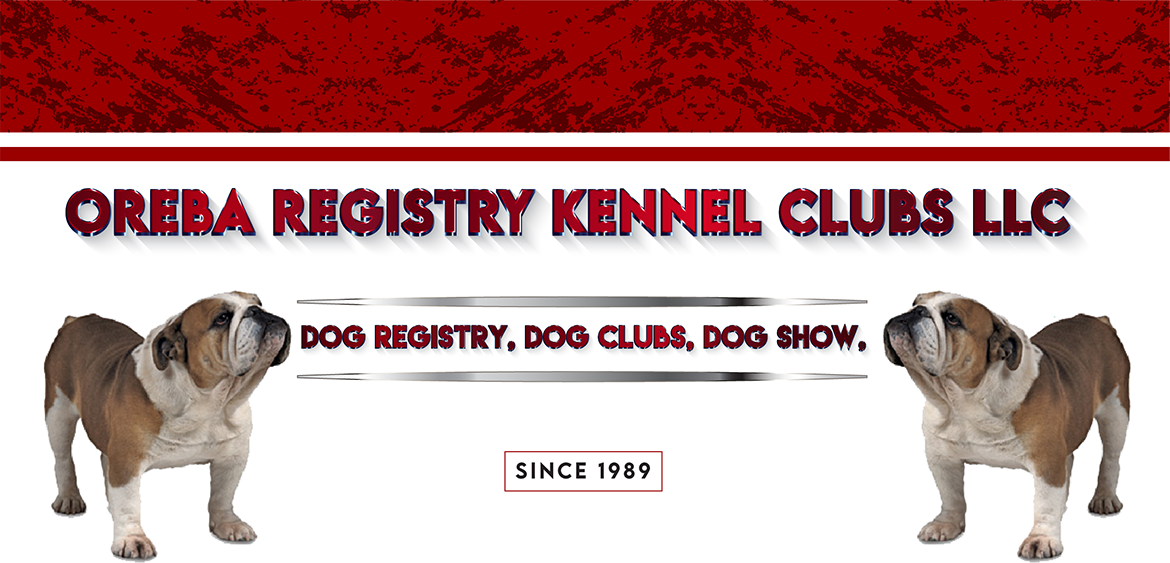- Home
- Contact Us
- Register
- ORKC Breeders
- About the ORKC
- Board of Directors
- ORKC Judges
- Breeds Set Standards
- Membership Benefits
- Certificate/Pedigree
- Register Litter
- Single Adult Register
- Single Puppy Register
- Register Kennel
- Register Kennel List
- Single Non Breeding Register
- Weight-pulling
- DNA Request
- Show Form
- Magazine/Newspaper
- 3 Generation
- 4 Generation
- 5 Generation
- Forms
- Link to Us
- ORKC Handicap Dog Register
- Online Store
Staffordshire Bull Terriers

The Staffordshire Bull Terrier, along with the American Pit Bull Terrier and American Staffordshire Terrier comprise a group of dogs often referred to as Bully breeds; collectively and generically this group is most often referred to as Pit Bulls. Although the vast majority of Staffordshire Bull Terrier and American Staffordshire Terrier breeders disfavor the term, it is the result of the conflict surrounding the relationship of the three breeds, with some saying that they are completely separate breeds, and others saying that are merely varieties of the same breed, e.g., Longhaired vs. Shorthaired Chihuahua.
The Staffordshire Bull Terrier is the direct descendent of 19th century English fighting dogs, and although the implication is that the breed would be dangerous due to its initial creation for the purpose of fighting to the death against other dogs, the modern incarnation is well known for its stability and affinity for people. The breed, however, is still the subject of breed specific legislation in some jurisdictions which either restricts ownership or bans possession of the breed outright. Staffordshire Bull Terriers are also known as Staffordshire Terriers, English Staffordshire Terriers, English Pit Bull Terriers, Staffy Bulls, and Staffies.
BREED BASICS
Country of Origin:
England
Size:
Medium 15-35 lb
Large 35-55 lb
LifeSpan:
12 to 15 Years
Trainability:
Very Easy To Train
Energy Level:
High Energy
Grooming:
Brushing Once a Week or Less
Protective Ability:
Good Watchdog
Hypoallergenic Breed:
No
Space Requirements:
House with Yard
Compatibility With Other Pets:
May Be Okay With Other Pets If Raised Together
Not Recommended For Homes With Existing Dogs
Not Recommended For Homes With Small Animals
Litter Size:
5-10 puppies
Names:
Staffordshire Terriers, English Staffordshire Terriers, English Pit Bull Terriers, Staffy, Bulls, Staffies Stafford, Staffy, Staff Bull
HEIGHT/WEIGHT
Males:
28-38 lbs, 14-16 inches
Females:
24-34lbs, 14-16 inches
KENNEL CLUBS AND RECOGNITION
American Kennel Club:
Terrier Group
ANKC (Australian National Kennel Council):
Group 2 (Terriers)
CKC(Canadian Kennel Club):
Group 4 (Terriers)
FCI (Federation Cynologique Internationale):
Section 3 : Bull type Terriers
KC (The Kennel Club):
Terrier
NZKC (New Zealand Kennel Club):
Group 2 – Terrier
UKC (United Kennel Club):
Terrier-UKC
HISTORY:
This breed is so closely related to the other types that comprise the Bully breed group, please see the history section of the article about Bully breeds for more information about the creation Staffordshire Bull Terrier and its relationship to the other members of the group.
APPEARANCE:
The Staffordshire Bull Terrier is the oldest of the three bully breeds, and is also the smallest and most Terrier-like. Most Staffordshire Bull Terriers stand between 14 and 16 inches tall at the shoulder. Males of this breed normally weigh between 28 to 38 pounds, and females normally weigh between 24 to 34 pounds. In recent years some American breeders have been breeding Staffordshire Bull Terriers than are much larger, but such dogs are ineligible in the show ring. Staffordshire Bull Terriers should ideally be squarely proportioned, meaning that they should be equally as long as they are tall. However, some breed members are significantly longer. Staffordshire Bull Terriers are very muscular, and would never be considered lean. However, this dog is considerably less stocky than the other Bully Breeds. The tail of the Staffordshire Bull Terrier is of medium length, low-set and tapers to a point. The tail of this breed is very rarely docked, a procedure which is actually illegal in many countries.
The head and face of the Staffordshire Bull Terrier are exactly what one would expect a cross between a Bulldog and a Terrier would look like. The head of the Staffordshire Bull Terrier is large for the size of the dog, and relatively squarely shaped. This breed has the smallest head of the three bully breeds, and also the shortest muzzle. Although quite short, the muzzle of this breed is nowhere near as short as that of a breed like an English Bulldog. This muzzle is also quite wide and powerful. This breed has relatively small eyes whose color is determined by coat color. The nose of a Staffordshire Bull Terrier should always be black. The ears of the Staffordshire Bull Terrier are relatively small, and also rose-shaped. These ears are tightly folded, and often held backwards. Although not especially preferred in the show ring, some Staffordshire Bull Terriers have slightly wrinkly faces, but not to the extent of other bully breeds. The overall expression of this breed varies greatly from animal to animal, with some looking happy-go-lucky and friendly and others looking serious and intimidating.
The coat of the Staffordshire Bull Terrier is short, smooth, and held close to the skin. Because the Staffordshire Terrier was primarily bred as a working dog, color was relatively unimportant to its breeders. As a result, this breed comes in a variety of colors including red, fawn, white, black, blue, and brindle. White markings may be present on any of these colors in any pattern or proportion.
GROOMING REQUIREMENTS:
All three of these dogs are among the easiest to groom. Their coats never require professional grooming, only an occasional brushing. These dogs do shed, although the amount varies from dog to dog. Some are only average shedders who will leave some hair but not an excessive amount while others, especially some American Pit Bull Terriers, shed almost constantly.
HEALTH ISSUES:
The Staffordshire Bull Terrier is considered to be a very healthy breed. This dog was bred almost strictly for working ability until the 1930’s, and breeders strive to maintain this ability to the present day. The dog also benefits from having a comparatively large genetic pool. This does not meant that the Staffordshire Bull Terrier is immune from genetically inherited health problems; it just means that it tends to suffer from fewer problems and lower rate of those problems than other breeds. Some of the biggest problems occur due to the fact that this breed is so pain tolerant that it does not make owners aware of a disease or injury until it is quite advanced. The average life expectancy for a Staffordshire Bull Terrier is between 10 and 16 years. One of the most common problems experienced by the Staffordshire Bull Terrier is cataracts. Cataracts in dogs are similar to those in humans, and can cause decreased vision or even blindness. There are treatments available for canine cataracts, but many require expensive surgery.
Because skeletal and visual problems have been known to occur in this breed (hip dysplasia is quite commonly seen) it is highly advisable for owners to have their pets tested by both the Orthopedic Foundation for Animals (OFA) and the Canine Eye Registration Foundation (CERF). The OFA and CERF perform genetic and other tests to identify potential health defects before they show up. This is especially valuable in the detection of conditions that do not show up until the dog has reached an advanced age, making it especially important for anyone considering breeding their dog to have them tested to prevent the spread of potential genetic conditions to its offspring.
A full list of health problems which are known to affect the Staffordshire Bull Terrier would have to include:
- Injury Prone
- Cataracts
- Hip Dysplasia
- Elbow Dysplasia
- Demodicosis/Demodectic Mange
- Brachycephalic Syndrome
- Gassiness
- Heat Intolerance
- Atopic Dermatitis/Skin Allergies
- L – 2 Hydroxyglutaric Aciduria
- Luxating Patella


